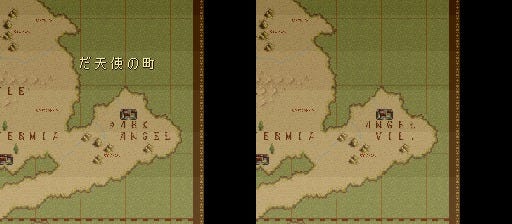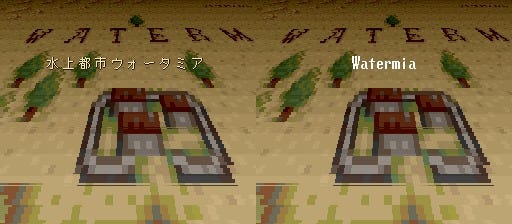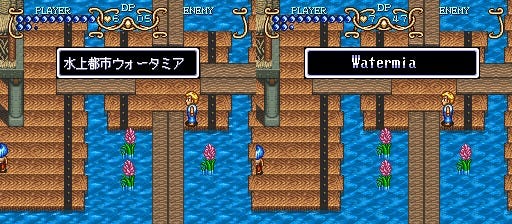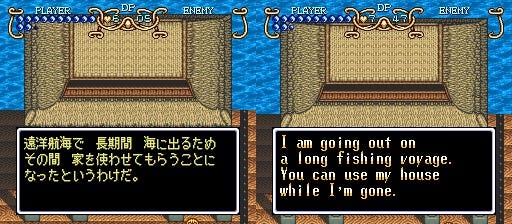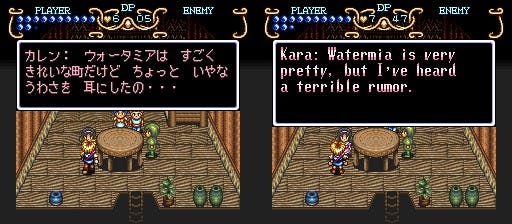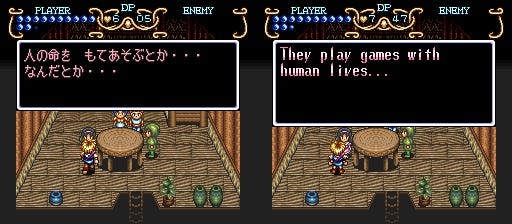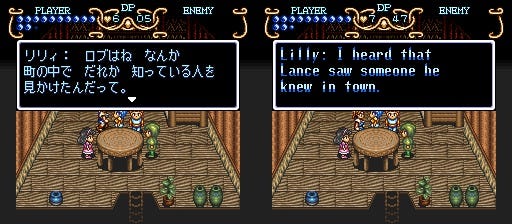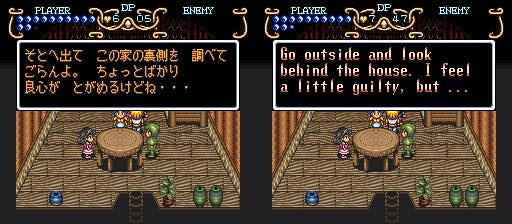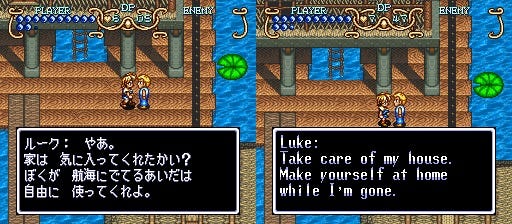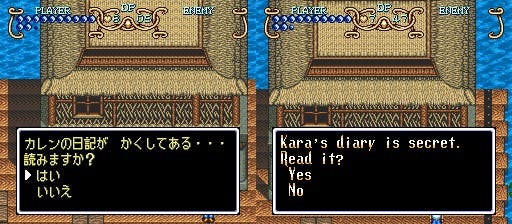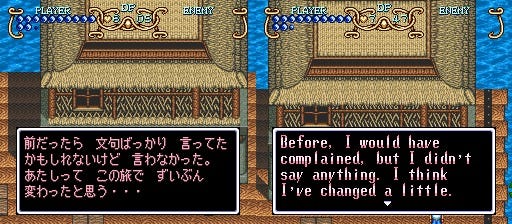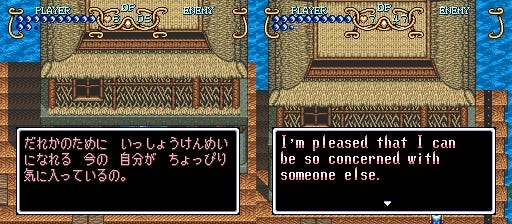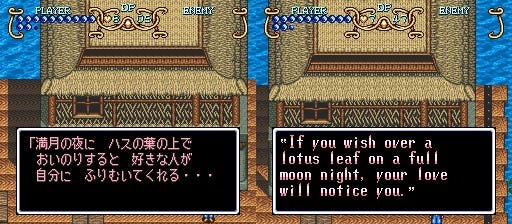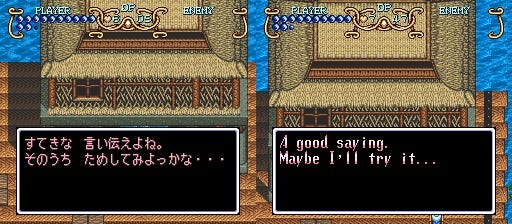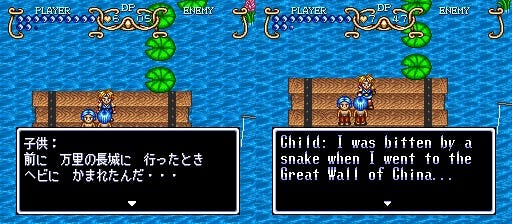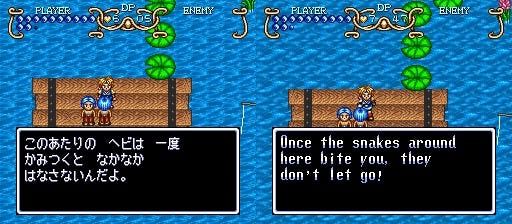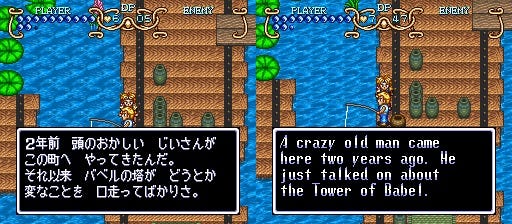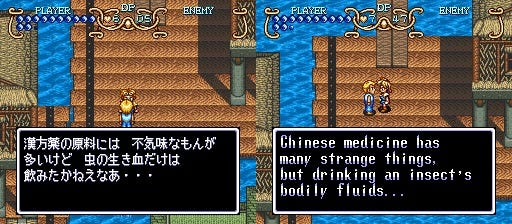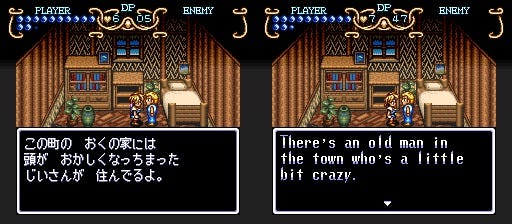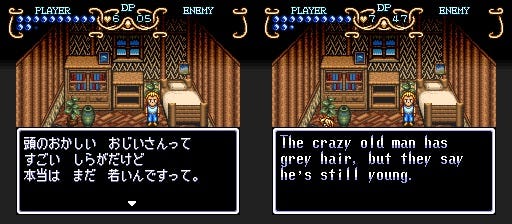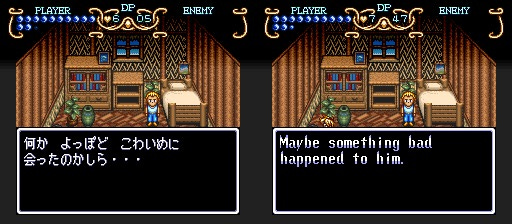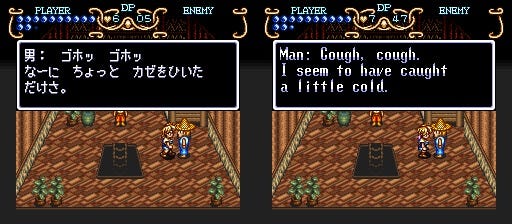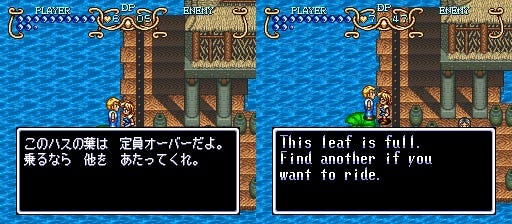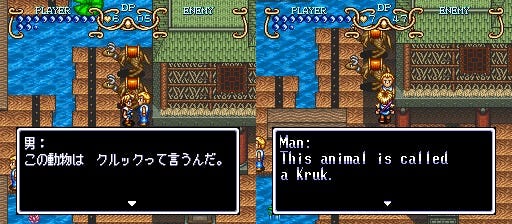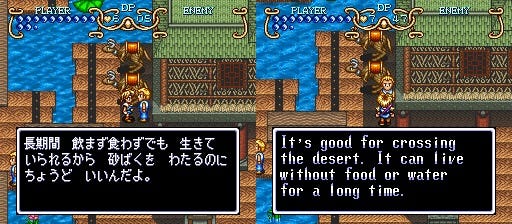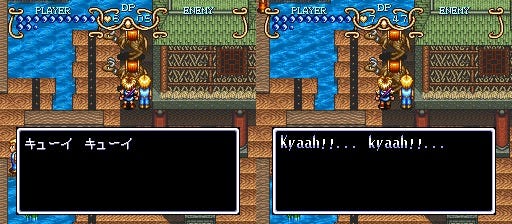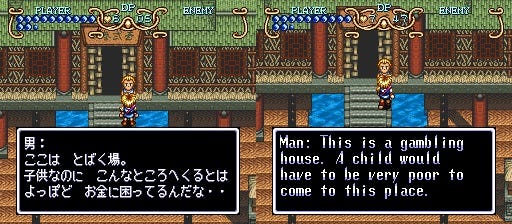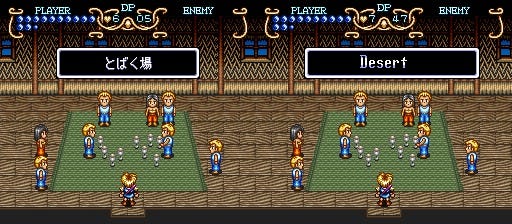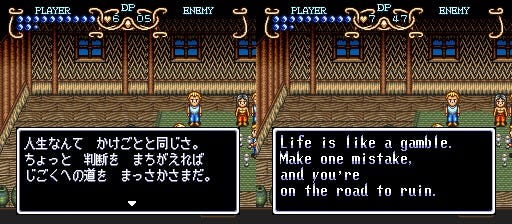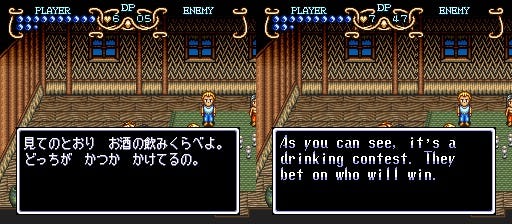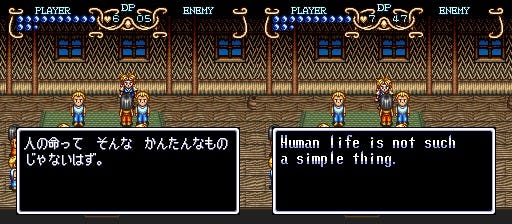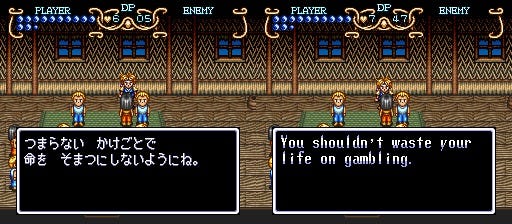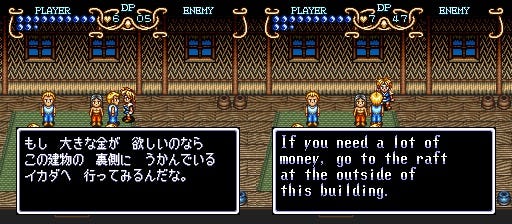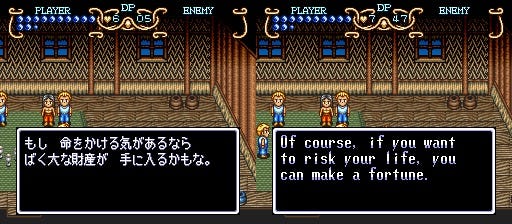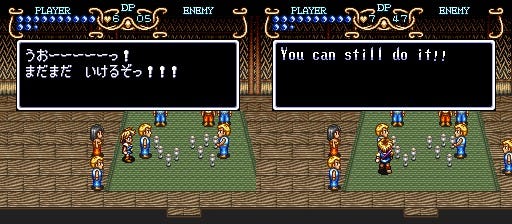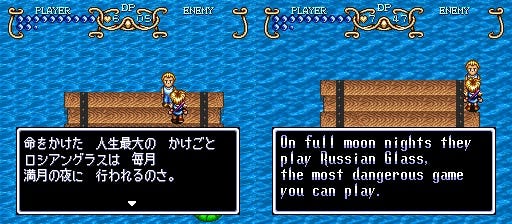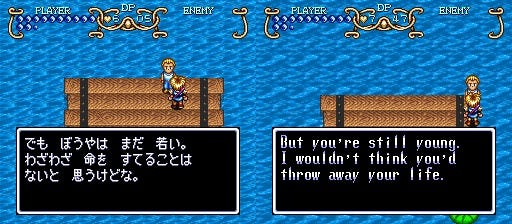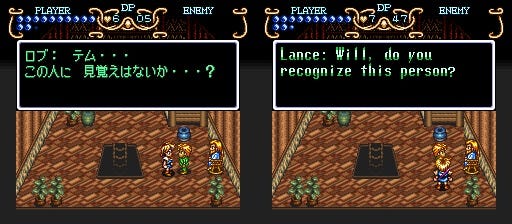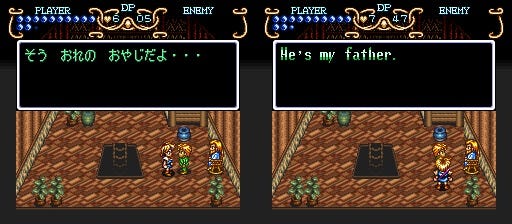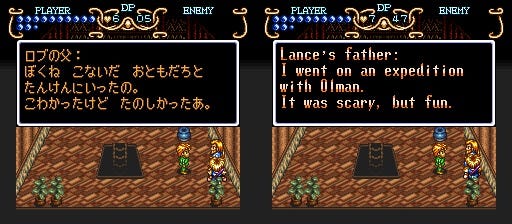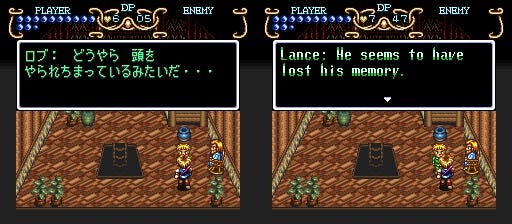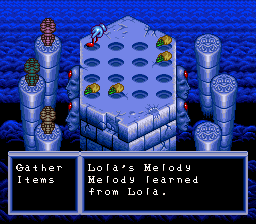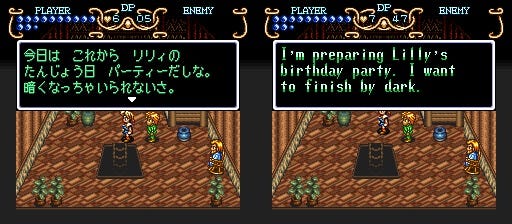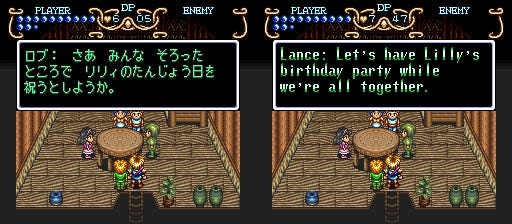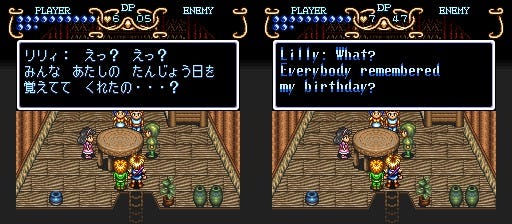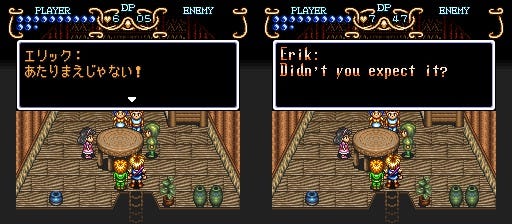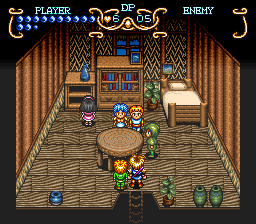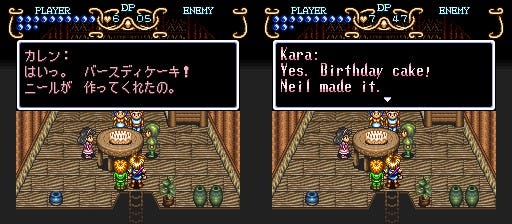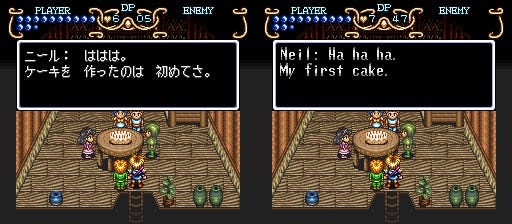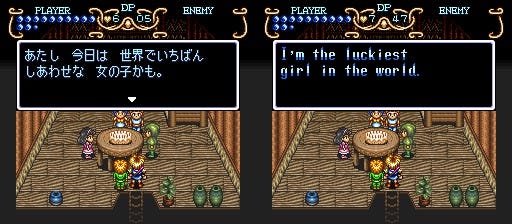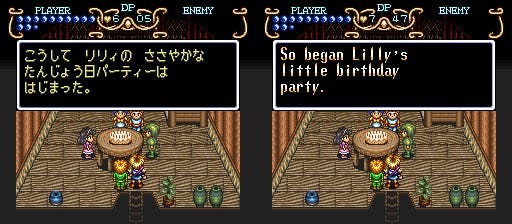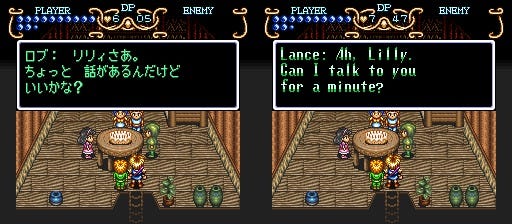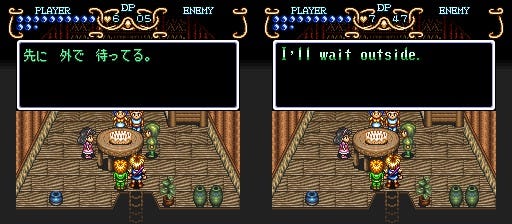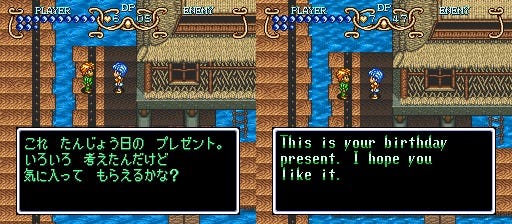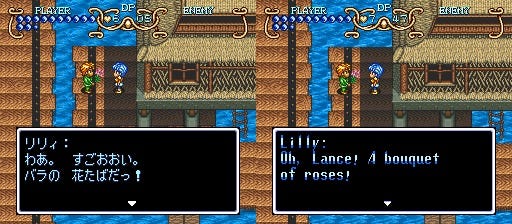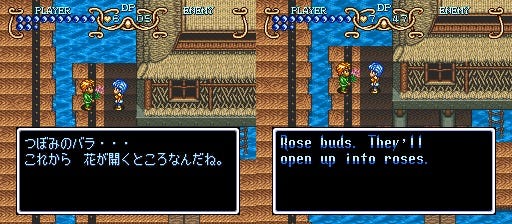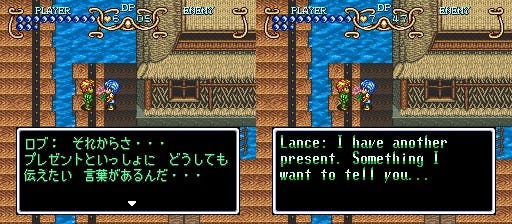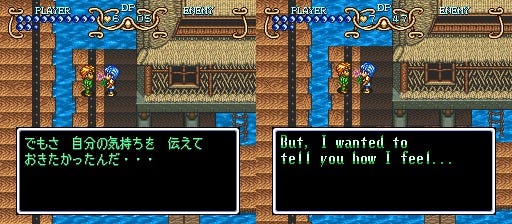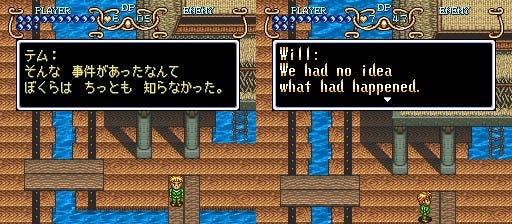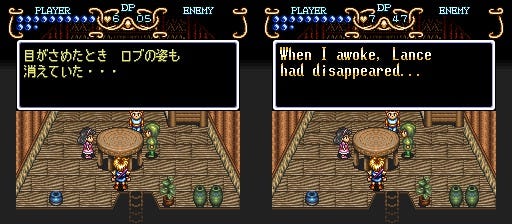The usual disclaimers:
I’m an amateur. My advantage over the original translation is that I have no deadline pressure, and I have the modern internet to help me. I’m assuredly wrong about some of my translations.
Translation is hard. When I point out a mistranslation, it’s not a judgment of the original translators. They had a deadline and poor resources.
Please no jokes in the comments about Karen being a Karen. I really hate that trend.
Notation reminder:
JP: Original Japanese
T: My translation
OE: Original English
We’re leaving Fallen Angel Village. On the world map:
Interesting. In JP the world map says Dark Angel. Unsurprisingly, they changed it to Angel Vil. in US.
The party heads over to…
Watermia. I tried to find any way this was a reference to a real place and came up with nothing. The Japanese name could be translated as Watermere, which does correspond to some real places, and the town-ending name of mere is a common one in the UK. But Watermia is near the Great Wall of China in this game’s universe. So… probably not British. I’m gonna stick with Watermia.
JP: 水上都市ウォータミア
T: Floating City Watermia
OE: Watermia
JP: ぼくらは 水上都市ウォータミアに やってきた。 イカダの上に 家が たちならび それは 美しい町だった。
町の人々も 親切で ぼくらは ルークという青年の家に とめてもらうことになった。
T: We arrived at the floating city, Watermia. It was an extremely beautiful city with houses built on rafts.
The townspeople were kind, and it was arranged that we would stay at the house of a young man named Luke.
OE: We went to the Water City, Watermia. A beautiful town with houses built on rafts.
The townspeople have kindly put us up at the house of young Luke.
Interesting that OE called it the Floating City repeatedly in Angel Village, but now translates the same words as Water City.
JP: そして ここが ルークの家。 彼は 漁師をやっている 好青年だ。
遠洋航海で 長期間 海に出るため その間 家を使わせてもらうことに なったというわけだ。
T: This is Luke’s house. He’s an affable young guy who works as a fisherman.
He was going to be out at sea for a long time on a fishing voyage, and we were allowed to use his house in the meantime.
OE: This is Luke’s house. He is a loveable young fisherman.
I am going out on a long fishing voyage. You can use my house while I’m gone.
In the first sentence, OE translates 好青年 (kouseinen) as loveable young and nabs fisherman from elsewhere in the sentence. My dictionary translates it as good young man or agreeable youth.
In the second sentence, OE puzzlingly switches to the perspective of Luke without putting it in quotes. Tim is supposed to still be relating what happened in 3rd person.
Inside Luke’s house, we gain control immediately and can talk to everyone.
JP: カレン: ウォータミアは すごく きれいな町だけど ちょっと いやな うわさを 耳にしたの...
人の命を もてあそぶとか... なんだとか...
T: Karen: Watermia’s an extremely beautiful city, but I overheard a nasty rumor.
The word is that they play a game with human lives.
OE: Kara: Watermia is very pretty, but I’ve heard a terrible rumor.
They play games with human lives…
We later find out that they play a drinking equivalent of Russian Roulette, in which a single glass is poisoned. I’ll promise I’ll spare you the Deer Hunter jokes, when the time comes.
JP: 花の都も そうだったけど 美しいものには 必ず 裏の顔が あるのかしら...
T: The City of Flowers was that way as well. I wonder if all beautiful things have such a hidden side.
OE: Freejia was the same way, but beautiful. Things always have another side to them…
Karen’s sentence is made of two clauses conjoined by けど (kedo - but), and OE mixes them up a little. Beautiful belongs in the second clause, modifying things, rather than the first clause, modifying Freejia/City of Flowers. And OE leaves out かしら (kashira - I wonder/don’t you think?) entirely.
JP: リリィ: ロブはね なんか 町の中で だれか 知っている人を 見かけたんだって。
で その人を さがしに 行ったみたいだよ。
T: Lily: Rob said that he caught sight of someone he knew in town.
I guess he went to look for him.
OE: Lilly: I heard that Lance saw someone he knew in town.
I guess he went to look for him.
It’s not certain who it is who said that Rob saw someone he knew, but Rob is the topic of the sentence, and is otherwise logically the most likely person to have told Lily about something he saw. I chose Rob as the speaker, OE left it unknown.
JP: エリック: えへへ。 さっき いいもの 見つけちゃった。
そとへ出て この家の裏側を 調べて ごらんよ。 ちょっとばかり 良心が とがめるけどね...
T: Erik: Heh heh. I came across something good a moment ago.
Go outside and look behind the house. I feel a little guilty about it, though.
OE: Erik: Heh heh. I’ve found something good.
Go outside and look behind the house. I feel a little guilty, but…
Ruh roh.
JP: ニール: このイカダの家は 新たな 発明の ヒントに なりそうだなあ...
T: Neil: I think this raft house gives me an idea for a new invention.
OE: Neil: The house on this raft gives me an idea for a new invention.
Time to explore the town. Immediately outside, we can talk to Luke:
JP: ルーク: やあ。 家は 気に入ってくれたかい? ぼくが 航海にでてるあいだは 自由に 使ってくれよ。
T: Luke: Hey there! I trust you’re happy with the house? You can use it as you like while I’m on my trip.
OE: Luke: Take care of my house. Make yourself at home while I’m gone.
I’ll check behind the house as Erik suggested:
JP: カレンの日記が かくしてある... 読みますか?
>はい
>いいえ
そうだな。 勝手に読むのも 気がとがめるし やめておこう...
T: Karen’s diary is hidden here. Read it?
>Yes
>No
Yeah, I’d feel bad reading it without permission. I’ll leave it alone.
OE: Kara’s diary is secret. Read it?
OK. You’d feel guilty reading it without permission…
PSA: Breaking into a loved one’s phone, journal, computer, email, or other private communication medium for the purpose of spying on them is abusive. Don’t do it. Ok?
Anyway, I’m gonna read Karen’s diary now. Hey, at least it’s not as bad as turning in an escaped slave!
JP: X月 X日 長い長い 道のりだったけど 水の都 ウォータミアへ やっと たどり着いた。
とちゅう のどがカラカラだったけど がまんしたし、 くつずれが できたけど ハンカチで 包帯をして がんばったわ。
T: X Month X Day
It was a long, long journey, but we’ve finally arrived at the water city, Watermia.
On the way, my throat got bone dry, but I toughed it out. I also got a blister on my foot, but I held out by using a handkerchief as a bandage.
OE: X Month X Day
After a long journey we arrive in the Floating City, Watermia.
I was parched after the journey. Blisters on my feet, but I wrapped them in my handkerchief.
Oddly, here the JP actually does say water city instead of floating city, but the OE translates it as floating city. It’s not a big deal, just a curiosity.
JP: 前だったら 文句ばっかり 言ってた かもしれないけど 言わなかった。 あたしって この旅で ずいぶん 変わったと思う...
だれかのために いっしょうけんめい になれる 今の 自分が ちょっぴり 気に入っているの。
T: Before, I would have done nothing but complain, but I didn’t say anything. I think I’ve changed a whole lot on this journey.
I kind of like the way I am now, being able to put so much effort in for the sake of someone else.
OE: Before, I would have complained, but I didn’t say anything. I think I’ve changed a little.
I’m pleased that I can be so concerned with someone else.
JP: さっき 町の人から こんな 言い伝えを 聞いちゃった。
「満月の夜に ハスの葉の上で おいのりすると 好きな人が 自分に ふりむいてくれる...
T: I just heard some folklore from a villager.
“If you make a wish on top of a lotus leaf on a full moon night, the person you love will love you back.”
OE: I’ve heard this saying from a villager.
“If you wish over a lotus leaf on a full moon night, your love will notice you.”
I really do appreciate the modern internet, in which I can google a phrase like ふりむいてくれる (furimuitekureru), which means turns around or will turn around, and see if it has any special meanings. Turns out, yes, it can indeed mean to fall in love with someone.
JP: すてきな 言い伝えよね。 そのうち ためしてみよっかな...
T: That’s a wonderful legend. Maybe I’ll give it a try one of these days.
OE: A good saying. Maybe I’ll try it…
Now I’ll run around and talk to everyone in town.
JP: 子供: ヘビにかまれたら めちゃくちゃに 走りまわれば いいのさ。 そしたら ポロっと 落っこちるよ。
T: Child: If you’re bitten by a snake, run around like crazy. If you do, it will fall off.
OE: Child: If you’re bitten by a snake, you should run around like crazy and he’ll let go.
JP: 子供: 前に 万里の長城に 行ったとき ヘビに かまれたんだ...
このあたりの ヘビは 一度 かみつくと なかなか はなさないんだよ。
T: Child: The last time I went to the Great Wall of China, I was bitten by a snake.
Once the snakes around here bite you, they don’t let go.
OE: Child: I was bitten by a snake when I went to the Great Wall of China.
Once the snakes around here bite you, they don’t let go!
There’s another pair of kids around, a boy and a girl:
JP: サーバス: ぼくの お父さんは 探検家なんだ。 もうじき 黄金の船を 見つけて 来るんだよっ!!
T: Servas: My father’s an explorer. Soon he’ll find the Gold Ship and come back home!
OE: Sabas: My father’s an explorer. Soon he will find the Gold Ship and come home!!
Um.
JP: ナナ: お父さんの 最後の手紙を 受けとってから もう 半年も 音さたがないの...
無事だと いいのだけれど...
T: Nana: It’s been half a year since we last got a letter from our father, and we haven’t heard from him since.
I hope he’s ok.
OE: Nana: We haven’t heard from our father since his last letter six months ago…
I hope he’s OK…
Ummmmmm.
Their names are Servas and Nana? And their father went to find the Gold Ship? The one that was in the Incan ruins?
Oh, no. Remember that skeleton with a locket that Tim had no qualms about digging through and reading?
Well, bad news, kids.
Of course, Tim doesn’t bother to tell these two children that their father is never coming home. Just leave them holding onto hope forever, Tim, it’s no big deal! They don’t need stupid things like “closure”!
I guess if he did tell them, they might disbelieve him. Why believe some dorky kid who claims to have conquered the legendarily dangerous ruins and to have set foot on the Gold Ship?
Still. Come on, man.
I was curious whether it was realistic for their father to have already decomposed to a skeleton by the time Tim finds him. (A: Yes, definitely so.) While reading about decomposition rates, I found a paper about how climate change will affect open-air human decomposition. The internet is full of wonderful things, if you let silly questions lead you to them.
JP: 2年前 頭のおかしい じいさんが この町へ やってきたんだ。 それ以来 バベルの塔が どうとか 変なことを 口走ってばかりさ。
T: 2 years ago, a crazy old man showed up at this village. Since then he’s only rambled weird things about the Tower of Babel.
OE: A crazy old man came here two years ago. He just talked on about the Tower of Babel.
Wait, 2 years? At the start of the game, it said it was the 1 year anniversary of the Tower of Babel incident. Is it supposed to have been a year since the game’s beginning at this point? We only lost about 2 months to the raft and the undersea tunnel. It must take a really long time to travel between locations in this game.
JP: 男: 万里の長城には サンドファンガー っていう でっけえ むかでが 生息してるって話だ。
そいつの体液は どんな 病気も 直す力が あるらしいぜ。
T: Man: They say that a huge centipede called the Sand Fanger lives in the Great Wall of China.
Apparently its bodily fluids can cure any illness.
OE: Man: I heard that a huge centipede called a Sand Fanger lives in the Great Wall of China.
They say fluid from it’s body can cure anything.
JP: 漢方薬の原料には 不気味なもんが 多いけど 虫の生き血だけは 飲みたかねえなあ...
T: Chinese herbal medicine uses several bizarre ingredients, but I haven’t ever drunk an insect’s lifeblood.
OE: Chinese medicine has many strange things, but drinking an insect’s bodily fluids…
The Japanese name for the Great Wall of China is 万里の長城 (banri no choujou) which means thousands of miles long defensive wall. So I was all set, in my translation, to exclude the word China from the name and call it the Great Wall. It’s not like this game to include modern country names relating to its ruins. But then this guy comes along and talks about 漢方薬 (kanpouyaku - Chinese herbal medicine). 漢 is a kanji commonly used to refer to China. For example, 漢和 (kanwa - China and Japan), 漢字 (kanji - Chinese characters), 漢文 (kanbun - Chinese classical literature), and so on. So screw it, I’m gonna call it the Great Wall of China and call this Chinese herbal medicine.
JP: 子供: いいことを 教えてあげる。
とばく場の 右の裏手で しばらく 持っててごらん。 ハスの葉が やってくるよ。
T: Child: Let me give you a tip.
Wait a little while on the right side behind the gambling den. A lotus leaf will come around.
OE: Child: I’ll tell you something.
Wait on the right side behind the gambling house. A lotus leaf will come.
JP: この町の おくの家には 頭が おかしくなっちまった じいさんが 住んでるよ。
なんでも オールマン探検隊の バベルの塔 調査に参加してただとか 何だとか。
T: There’s a crazy old man living in a house in this town.
I hear that he went on the Allman expedition to the Tower of Babel.
OE: There’s an old man in the town who’s a little bit crazy.
He was with the explorer, Olman, on his expedition to the Tower of Babel.
JP: 頭のおかしい おじいさんって すごい しらがだけど 本当は まだ 若いんですって。
何か よっぽど こわいめに 会ったのかしら...
T: The crazy old man has really white hair, but they say he’s actually still young.
I wonder if something scary happened to him.
OE: The crazy old man has grey hair, but they say he’s still young.
Maybe something bad happened to him.
JP: 女: ここは ウォータミア。 家は みんな イカダの上だから ひっこしなんて 楽なものよ。
T: Woman: This is Watermia. The houses are all on rafts so it’s easy to relocate.
OE: Woman: This is Watermia. The houses are built on rafts. We like to move around.
JP: 女: もうじき 赤ちゃんが生まれるの。 うちの人ったら 楽しみにしちゃって はりきって 仕事をしてるわ。
T: Woman: Our baby will be born soon. My husband is working enthusiastically in preparation.
OE: Woman: Soon the baby will be born. Our family goes about their jobs in high spirits.
JP: 男: ゴホッ ゴホッ なーに ちょっと カゼをひいた だけさ。
T: Man: *Cough* *cough*. I caught a small cold.
OE: Man: Cough, cough. I seem to have caught a little cold.
In fiction, coughing means dying. So, uh… we’ll be seeing this guy again. When he dies.
This guy by the entrance just repeats the line about moving.
JP: 子供: ぼくたちは この水を 飲んで この水で ごはんを作って この水で せんたくをするんだ。
T: Child: We drink this water. We use this water to make meals. We use this water to wash clothes.
OE: Child: We drink this water, cook with it, wash with it.
The OE is fine but there’s some repetition in the JP I wanted to capture. The kid is describing how their whole lives are centered around the water they live on.
JP: 水は 同じ場所に とどまって いないわ。 たえまなく 動いて 自分を きれいに しようとするの。
わたしたちも 水のように 生きたいものね...
T: Water never remains in the same place. It’s always moving, making itself clean.
We want to live in the same way.
OE: Water never stays in the same place. It’s always moving and cleansing itself.
We want to live like the water.
If you wait next to this person, a dude floating on a lotus leaf will pop by.
JP: このハスの葉は 定員オーバーだよ。 乗るなら 他を あたってくれ。
T + OE: This leaf is full. Find another if you want to ride.
JP: 男: この動物は クルックっていうんだ。
長期間 飲まず食べわずでも 生きて いられるから 砂ばくを わたるのに ちょうど いいんだよ。
T: Man: This animal is called a kruk.
Since it can go a long time without food or water, it’s perfect for crossing the desert.
OE: Man: This animal is called a Kruk.
It’s good for crossing the desert. It can live without food or water for a long time.
JP: キューイ キューイ
T: Kyooee kyooee
OE: Kyaah!!… kyaah!!…
I translated the JP phonetically. But OE is right to choose something closer to what an English speaker would think of as an animal sound. We tend not to give animals sounds that are uncommon in our language. The oo-ee sound is rare in English. The yoo-ee sound is even less common; the only thing I can think of offhand is the name Huey.
JP: 男: ここは とばく場。 子供なのに こんなところへくるとは よっぽど お金に困ってるんだな..
T: Man: This is a gambling den. If a kid like you needs to come to a place like this, you must be real hard up.
OE: Man: This is a gambling house. A child would have to be very poor to come to this place.
Let’s take a close look at the sign above the door in both versions:
Oh, huh. No changes at all. Anyway, I can’t make out what it says. Feel free to educate me. Anyway, let’s go in:
JP: とばく場
T: Gambling den
OE: Desert
Desert?
The JP has once again done that thing where it represents a word as part kana part kanji, when it would normally be represented as all kanji. It says とばく場 (tobakujou) which would normally be written as 賭博場 (same pronunciation). Had they used all kanji, there’s no way we would have gotten this mistranslation.
The Japanese word for desert is さばく (sabaku) which is one kana different from the word for gambling, とばく (tobaku). I can understand misreading the first part of the word, especially since someone outside the gambling den had just talked about crossing the desert on kruks. (Though there it was spelled as 砂ばく rather than the normal all-kanji 砂漠 or all-kana さばく.) The kanji 場 means place. I guess if it had been misread as desert place you might simply translate that as desert.
JP: 人生なんて かけごとと同じさ。 ちょっと 判断を まちがえれば じごくへの道を まっさかさまだ。
人間 それを 無意識のうちに やってるもんさね。
T: Life is just like gambling. A small misjudgment can ruin everything.
Nevertheless, people do so involuntarily.
OE: Life is like a gamble. Make one mistake, and you’re on the road to ruin.
People do that unconsciously.
He literally says you’ll go headlong on the road to じごく (jigoku - hell).
JP: 見てのとおり お酒の飲みくらべよ。 どっちが かつか かけてるの。
T + OE: As you can see, it’s a drinking contest. They bet on who will win.
JP: 人の命って そんな かんたんなもの じゃないはず。
つまらない かけごとで 命を そまつにしないようにね。
T: Human lives shouldn’t be so short.
Don’t waste your life on a stupid gamble.
OE: Human life is not such a simple thing.
You shouldn’t waste your life on gambling.
かんたん (kantan) as a na-adjective often means simple or easy, but it can also mean brief or quick. She’s definitely saying that life should not be かんたん, so I’m pretty sure it has the latter meaning.
JP: もし 大きな金が 欲しいのなら この建物の 裏側に うかんでいる イカダへ 行ってみるんだな。
T: If you want to make big money, check out the raft hidden behind this building.
OE: If you need a lot of money, go to the raft at the outside of this building.
裏側 (uragawa) wouldn’t normally mean outside. It means the reverse side, the back side, or the hidden side.
JP: 少しばかりの金を かけても 大きな金は 手に入らないものさ。
もし 命をかける気があるなら ばく大な財産が 手に入るかもな。
T: You’ll never make big money with small stakes.
But if you’re willing to put your life on the line, you might make a fortune.
OE: Betting small money won’t make you big money.
Of course, if you want to risk your life, you can make a fortune.
JP: うーん うーん
T: *Moan*
OE: Uhnn…
The original says uun uun. It’s tough to translate these kinds of grunts and groans. I guess the idea is that this man is getting so blotto that he can’t speak.
JP: うおーーーーーっ! まだまだ いけるぞっ!!!
T: Let’s gooooo! I can still hold my drink!
OE: You can still do it!!
まだまだ (madamada) means still and いける (ikeru) means to hold one’s liquor or to be able to do so. ぞ (zo) at sentence end can mean: to express intent, to persuade or encourage someone to do something, or to indicate resolution. The original translated it as the second meaning, as if this man is saying that someone else can still do it. In the past I assumed he was speaking to his opponent, which didn’t make any sense. Nor would it make any sense if he were speaking to Tim. No, it’s the third meaning. He’s speaking to himself, psyching himself up.
If you check out the raft behind the gambling den, there’s a single person there:
JP: 命をかけた 人生最大の かけごと ロシアングラスは 毎月 満月の夜に 行われるのさ。
でも ぼうやは まだ 若い。 わざわざ 命を すてることは ないと 思うけどな。
T: Every month on the night of the full moon, they play a game called Russian Glass where they stake their lives on the ultimate gamble.
But you’re still young. I don’t think you’d throw your life away like that.
OE: On full moon nights they play Russian Glass, the most dangerous game you can play.
But you’re still young. I wouldn’t think you’d throw away your life.
Now I’m going to backtrack to the northwest side of town. Everyone’s been talking about a crazy guy, so let’s meet him. Oh, hey, Rob is there:
JP: ロブ: テム... この人に 見覚えはないか...?
そう おれの おやじだよ...
T: Rob: Tim, do you recognize this man?
Yeah, it’s my dad.
OE: Lance: Will, do you recognize this person?
He’s my father.
Hey, let’s back up a second. Earlier, didn’t someone say…
Computer, enhance:
There are a few white pixels there, but they look like ordinary shading to me, like light reflecting off his hair. I call shenanigans! Let’s talk to shenanigans and see what he has to say:
JP: ロブの父: ぼくね こないだ おともだちと たんけんにいったの。 こわかったけど たのしかったあ。
T: Rob’s father: You know what? The other day I went out exploring with some friends. It was scary, but fun too.
OE: Lance’s father: I went on an expedition with Olman. It was scary, but fun.
It always bothered me that everyone in town talks about how crazy this guy is. Then when you talk to him, he says something indicating his memory is fine, the only weirdness being that he thought the disaster was fun.
In JP he seems to have lost sense of time. He sounds like a child.
JP: ロブ: どうやら 頭を やられちまっているみたいだ...
行方不明のおやじに やっと 会えたと思ったら これだもんな..
T: Rob: He must have suffered a head injury.
Just when I thought I’d finally found my missing father, it turns out he can’t remember me.
OE: Lance: He seems to have lost his memory.
I finally met my lost father, but…
Hey, remember that time we finally found Rob and he had lost his memory? Fun times. And remember we you had a cure for him? Maybe you should play the melody of memories, Tim?
Oh? It’s inexplicably not in my inventory anymore. Ah, well, what can you do. Sometimes the song disappears from your inventory, and then you don’t know it anymore. ¯\_(ツ)_/¯
When you try to leave:
JP: ロブ: テム まってくれ。 おれも いくよ。
T + OE: Rob/Lance: Tim/Will, wait. I’ll go, too.
JP: 今日は これから リリィの たんじょう日 パーティーだしな。 暗くなっちゃいられないさ。
さあ 部屋へ もどろうぜ。
T: Lily’s birthday party is coming up today. We can’t afford to wait for it to get dark.
Let’s head back to our room.
OE: I’m preparing Lilly’s birthday party. I want to finish by dark.
Let’s go to our room.
JP: ロブ:さあ みんな そろった ところで リリィのたんじょう日を 祝うとしようか。
リリィ: えっ? えぅ? みんな あたしの たんじょう日を 覚えてて くれたの...?
T: Rob: Now that we’re all here, let’s celebrate Lily’s birthday.
Lily: Huh? What? You all remembered my birthday?
OE: Lance: Let’s have Lilly’s birthday party while we’re all together.
Lilly: What? Everybody remembered my birthday?
JP: エリック: あたりまえじゃない!
びっくりさせようと思って みんなで ないしょに してたんだ。
T: Erik: Of course we did!
Everybody kept it secret to surprise you.
OE: Erik: Didn’t you expect it?
Everybody kept it secret to surprise you.
JP: ニール: ほら カレン。 あれを もっておいで。
T: Neil: Hey, Karen. Bring it on out.
OE: Neil: Hey Kara. Bring that.
Karen goes over to the nearby shelf and takes something off:
At this point, it’s traditional to sing a song!
JP: カレン: はいっ。 バースディケーキ! ニールが 作ってくれたの。
T: Karen: Here you go. It’s a birthday cake! Neil made it.
OE: Kara: Yes. Birthday cake! Neil made it.
はい (hai) usually means yes. It can also mean no. Or I understand or ok or what? or here/here you go.
JP: ニール: ははは。 ケーキを 作ったのは 初めてさ。
飛行機を作るより ずっと むずかしかったよ。
T: Neil: Hahaha. It’s the first cake I’ve ever made.
It was way harder than building an airplane.
OE: Neil: Ha ha ha. My first cake.
It was harder than building an airplane.
JP: リリィ: ありがとう... みんな...
あたし 今日は 世界でいちばん しあわせな 女の子かも。
T: Lily: Thank you, everyone.
Right now I might be the luckiest girl in the world.
OE: Lilly: Thank you, everyone. . .
I’m the luckiest girl in the world.
JP: こうして リリィの ささやかな たんじょう日パーティーは はじまった。
そして パーティーが終わるころ..
T: So began Lily’s modest birthday party.
Then, as the party was wrapping up…
OE: So began Lilly’s little birthday party.
The end of the party…
JP: ロブ: リリィさあ。 ちょっと 話があるんだけど いいかな?
先に 外で 待ってる。
T: Rob: Hey, Lily. Can I talk to you for a minute?
I’ll be waiting outside.
OE: Lance: Ah, Lilly. Can I talk to you for a minute?
I’ll wait outside.
JP: リリィ: ?? なんだろ? いったい...
リリィ: ごめんね。 ちょっと いってくる。
T: Lily: Huh? What the heck’s this about?
Lily: Excuse me. I’ll be right back.
OE: Lilly: Huh? I wonder what?
Lilly: Excuse me everyone. I’ll be right back..
Y’know what? I’m feeling really positive about this. Rob is sure to woo her, right?
Yeah! That guy know what up.
JP: リリィ: なあに?
いつもの ロブらしくないよ。 なんだか かしこまっちゃってさ。
T: Lily: What’s up?
You’re not your usual self. You’re acting all proper.
OE: Lilly: What?
You’re not yourself. Relax.
JP: ロブ: そうだろ。 おれも 自分が 自分じゃない みたいだよ。
それ たんじょう日の プレゼント。 いろいろ 考えたんだけど 気に入って もらえるかな?
T: Rob: Yeah, you’re right. I’m not acting like myself.
This is your birthday present. I put a lot of thought into it. I hope you like it.
OE: Lance: You’re right. I’m not myself right now.
This is your birthday present. I hope you like it.
JP: リリィ: わあ。 すごおおい。 バラの 花たばだっ!
つぼみのバラ... これから 花が開くところなんだね。
T: Lily: Wow! It’s wonderful. A bouquet of roses!
The buds are just about to bloom!
OE: Lilly: Oh, Lance! A bouquet of roses!
Rose buds. They’ll open up into roses.
ところ (tokoro) frequently means place, but following the plain form of a verb often means about to or on the verge of.
JP: リリィ: すてきな かおり...
ありがとう。 すっごく うれしい...
T: Lily: They smell lovely.
Thank you. I’m delighted.
OE: Lilly: They smell wonderful…
Thank you. They’re beautiful…
JP: ロブ: それからさ... プレゼントといっしょに どうしても 伝えたい 言葉があるんだ...
リリィ: なあに?
T: Rob: There’s something else. Besides the present, there’s also something I have to tell you, no matter what.
Lily: What is it?
OE: Lance: I have another present. Something I want to tell you…
Lilly: What?
It’s minor, but Rob doesn’t say that he has another present. He says プレゼントといっしょに (purezento to isshoni) which means together with present or at the same time as present.
JP: ロブ: うん。 早口言葉なんかより ずっと むずかしい 言葉なんだけど...
ロブ: リリィ... 君のことが 好きだ...
T: Rob: Oof. The words are harder to say than a tongue twister.
Rob: Lily, I’m in love with you.
OE: Lance: Yes, the words are harder to say than a tongue twister.
Lance: Lilly… I love you…
うん (un) generally means yes but it’s also used as a filler, the same way people use um. That’s how I would have translated it here, except that it’s followed by a period instead of a comma. Oof is given as the third sense in the dictionary I’m using, and I think that’s the intent.
Yep, I totally agree, generic guy from Final Fantasy Tactics! Rob is nailing his profession of love to the 15 year old.
JP: ロブ: すぐ 返事を してくれなくても いい...
でもさ 自分の気持ちを 伝えて おきたかったんだ...
T: Rob: It’s fine if you don’t want to reply right away.
But I had to tell you how I feel.
OE: Lance: You don’t have to answer right away…
But, I wanted to tell you how I feel…
At this point, there’s an awkward pause. Then Lily turns into a dandelion seed and flies away.
You said it, buddy!
JP: ロブ: リリィ! まってくれっ!!
T + OE: Lily/Lilly! Wait!
JP: テム: そんな 事件があったなんて ぼくらは ちっとも 知らなかった。
その日 リリィは 部屋へ もどってこなかった...
T + OE: Tim/Will: We had no idea what had happened.
That day, Lily/Lilly didn’t come back to her room.
JP: テム: そして 翌朝....
目がさめたとき ロブの姿も 消えていた...
T: Tim: Then, the next morning…
When I awoke, Rob was nowhere to be found.
OE: Will: So in the morning…
When I awoke, Lance had disappeared…
Erik and Neil have nothing new to say. Karen says:
JP: カレン: ロブと リリィ どうしたのかしら。 心配よね...
T: Karen: I wonder what happened to Rob and Lily? I’m worried.
OE: Kara: What happened to Lance and Lilly? I’m worried.
Rob and Lily aren’t in town anywhere. It’s easy to get stuck here if you don’t think to check your inventory. There, you’ll find a letter that wasn’t there before:
JP: ロブのてがみ
ロブからの テムにあてられた てがみ。
T: Rob’s letter
Letter from Rob addressed to Tim.
OE: Lance’s letter
Letter from Lance.
You have to equip it and use it. (lol look at how many more herbs I’ve used in the US version. I told you it was harder.)
JP: ロブの手紙を 開いた。
T: Opened Rob’s letter.
OE: He opened Lance’s letter.
JP: ロブ: おれは ちょっと 万里の長城まで 行ってくる。
みんなは ないしょのつもりだった けど テムにだけは 伝えておこうと 思う...
T: Rob: I’m off to the Great Wall of China.
I was going to keep it secret from everyone, but I thought I’d tell you alone.
OE: Lance: I’m going to the Great Wall of China.
I intended to keep it secret, but I told Will just in case…
JP: テムの荷物の中に この手紙を 入れとくけど 気づいてくれたかな。 テムは にぶいからな。
町の人の話から おやじの病気を 直す方法が わかったんだ... 万里の長城に その薬があるらしい。
T: I’m putting this letter in your luggage, but I doubt you’ll notice, since you’re so obtuse.
I found out from a townsperson that my father’s illness can be cured. It seems there’s a medicine at the Great Wall of China.
OE: I’m putting this letter in his luggage, but he probably won’t notice.
The townspeople say there’s some kind of cure for my father at the Great Wall.
Yeah, he insults Tim in the letter in JP. He calls him にぶい (nibui) which means obtuse, thickheaded, stupid. It means dull like a knife, but it’s used to mean dumb the same way it is in English. Rob’s in a mood, I guess. I wonder why?
I chose to render townsperson as singular because there was one person in town yammering about the centipede’s blood. I’m assuming Rob heard from the same person. But townspeople is equally valid.
JP: 道のりは 長いけど マラソンでも するつもりで 行ってくるよ。 心配しないでくれ。
追しん: あ そうそう... リリィに ふられちまったよ。
T: It’s a long journey, a marathon even, but I plan to go anyway. Don’t worry about me.
P.S.: Oh, one more thing: Lily rejected me.
OE: It’s a long journey, but I’d go anywhere if it would help him. Don’t worry about me…
P.S.: By the way, Lilly has left me.
Rob, I’m gonna worry about you, buddy. You stand no chance against the giant centipede. You don’t even have a flute to hit it with!
OE translated リリィに ふられちまった (ririi ni furarechimatta) as Lilly has left me. I always thought this was funny. It describes what happened literally: she ran away, she left. But she left me usually has the implication that you were a couple and she broke up with you. Rob and Lily were never a couple, so it’s a weird way to phrase it. Dictionary definitions for this word include to be given the cold shoulder, to be jilted, to be rejected, and to be dumped. Lilly has left me sounds like the second or fourth definition, but either of the other 2 would be more appropriate. Rob was rejected, not dumped.
And that covers the events of Watermia. In the next entry, we go through the thousands of miles long defensive wall. Exciting!




